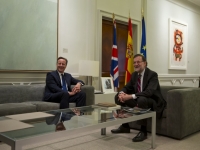Politics
Europe turns its back to an independent Catalonia
According the British Prime Minister
First it was the German Chancellor, Angela Merkel, and last Friday it was the turn of the British Prime Minister, David Cameron, an official visit to Spain, to offer support to the Government of Mariano Rajoy in his rejection of a hypothetical independence of Catalonia. Nationalist Democratic Convergence of Catalonia (CDC in its acronym in Spanish) and ERC Republicans want to turn the regional elections on September 27 in a plebiscite, and strive to reclaim the Catalan clear support at the polls they allow unilaterally declare independence of Catalonia in October. His obsession with the secessionist project is so deep that if do not get the overwhelming support they want, do not give up their plans, but would defer secession until 2016.
To gain the support of the Catalan independence parties they have not hesitated to promise that an independent Catalonia would continue within the European Union, continue to use the Euro and raise their income by the trade balance and taxes. Speaking in Brussels, Commission President, Jean Claude Juncker, warned that if it is separated from Spain, is not sure to Catalonia can continue within the EU. Less diplomatic correction was German Chancellor Angela Merkel, when just over a week she expressed full support for the position of the Government of Mariano Rajoy, who refuses to negotiate Catalan independence and presented in Parliament a proposal for reform Constitutional Court which will suspend the Catalan authorities.
But the clearer the independence aspirations slap he gave on Friday the British Prime Minister, David Cameron, who has been placed by the Catalan secessionist as negotiator model ruler. Both CDC and ERC have enough of equating the cases of Scotland and Catalonia to reproach Rajoy that if Cameron was able to negotiate with the Scots, the president of the Spanish Government should negotiate with Catalonia. But the 'premier' British was clear on Friday during his appearance before the press with Mariano Rajoy: "No two situations are alike," Cameron said before remembering that Scottish independence never skipped law.
Because the rule of law is essential for Europe. Any attempt for independence must be "under the rule of law," said the British Prime Minister. "I think it's pretty clear," he added: "When part of a State separates from that State, will not be part of the European Union and shall take his place in the queue of other countries that have applied for membership of the Union. That is the position taken by the Commission and the constitutional principles of the European Union." Cameron said that "whatever the situation that we face, it is very important that countries, governors, prime ministers, all have to respect the rule of law and act according to the rule of law. I think this is very important."
Catalan separatists were quick to respond and Saturday, just hours after David Cameron underline that "we are better together," President of the Government of Catalonia, Artur Mas, called on "concerned not hear the words of governments they support each other" and again promised that "nothing will change now" and an independent Catalonia would remain a member of the European Union.
Liability for this article lies with the author, who also holds the copyright. Editorial content from USPA may be quoted on other websites as long as the quote comprises no more than 5% of the entire text, is marked as such and the source is named (via hyperlink).






